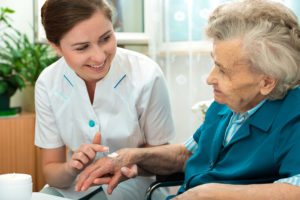Signs and Symptoms of Psoriasis
Senior Care in East Grand Rapids MI
October 29 is World Psoriasis Day. This the ideal opportunity for you to learn more about this condition and how to detect it so that you can help your elderly loved one cope if this condition  becomes a part of their later years. Helping your senior deal with psoriasis starts with identifying the signs and symptoms that might indicate this condition. Detecting these symptoms can enable you to tell when your parent might be suffering the need for additional attention. This way you can get them to the doctor as soon as possible and get them on the treatment that is right for their needs.
becomes a part of their later years. Helping your senior deal with psoriasis starts with identifying the signs and symptoms that might indicate this condition. Detecting these symptoms can enable you to tell when your parent might be suffering the need for additional attention. This way you can get them to the doctor as soon as possible and get them on the treatment that is right for their needs.
Some of the signs and symptoms of psoriasis include:
- Patches of red skin covered with scales that tend to appear silvery in color
- Small scaly spots
- Skin that becomes so dry and cracked that it might bleed
- Itching or burning sensation on the skin
- Soreness on the skin
- Thickened finger or toenails
- Pitted or ridged texture on the finger or toenails
- Swollen joints
- Stiff joints
It is important to note that there is not just one type of psoriasis. Understanding the difference in the types can help you to differentiate signs and symptoms. Some of these types include:
- Plaque. Characterized by raised, dry, scaly lesions that may be painful and itchy, and can occur on any area of the body, including inside the mouth. This is the most common form of psoriasis and can result in just one small area of plaques or many clusters.
- Nail. Characterized by discoloration, pitting, or abnormal growth of the finger or toenails. This may also cause the affected nail to become loose, separate from the nail bed, or even crumble completely.
- Scalp. Characterized by red, itchy patches on the scalp that may be covered with silvery or white scales. These patches might go beyond the scalp and hairline. Your aging loved one might notice flakes of skin on their clothing after scratching their scalp.
- Inverse. Unlike plaque psoriasis, this form is characterized by red, inflamed skin that is smooth rather than covered in scales. This type generally occurs in the groin, under the breasts, in the armpits, and other such areas of the body, and may be made worse by sweating or friction. Inverse psoriasis is often triggered by fungal infections of the skin.
If your aging loved one has recently been diagnosed with psoriasis, now may be the ideal time for you to consider starting senior care for them. Coping with a chronic condition such a psoriasis can have a serious impact on your aging parent’s quality of life and may cause them to not engage in the world around them as much. With the personalized services of a senior home care services provider, however, your aging loved one can address their individual needs, challenges, and limitations in a way that respects their personality, thoughts, beliefs, and goals. This allows them to maintain their highest quality of life while staying active and independent as they age in place.
If you or someone you know needs help with senior care in East Grand Rapids, MI, contact Gauthier Family Home Care. We provide quality and affordable home care services in our community. Call us at (616) 258-2300 for more information.
Sources:
http://www.mg217.com/your-psoriasis/statistics-about-psoriasis/
https://www.psoriasis.org/?gclid=CKnp482x288CFYEehgodg7QI1Q
http://www.mayoclinic.org/diseases-conditions/psoriasis/basics/symptoms/con-20030838
- Ensuring a Smooth Transition From Hospital to Home - June 4, 2025
- Caregiver of the Month – June 2025 - June 2, 2025
- Common Sense Summer Tips for Seniors to Help Them Beat the Heat - May 28, 2025

